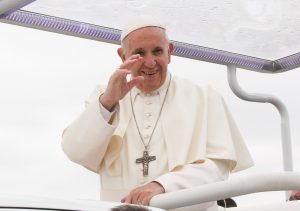
By Cian Molloy - 23 September, 2018

Pope Francis has established a new diocese in China.
A provisional agreement on the appointment of bishops has been signed by representatives of the People’s Republic of China and the Holy See.
The agreement has seen Pope Francis establish a new diocese in the country.
These latest moves signal a thawing of relations between the Church of Rome and the Communist Party of China. When the Communist Party came to power in China in 1951, diplomatic relations with the Holy See were broken up and a new Church was established, the Chinese Catholic Patriotic Association (CPA), whose bishops were appointed by the Beijing Government.
The Pew Research Centre estimates that out of a total population of 1.3 billion, the number of Catholics on mainland China is around 9 million. More than half of these (5.7 million) are affiliated with the CPA.
When the CPA was founded, the Roman Catholic Church became an underground Church, and its bishops, priests, religious and active lay members were frequently imprisoned by the Communist authorities.
Such was the threat to the leadership of China’s Roman Catholic Church that when John Paul II appointed Bishop Ignatius Kung Pin-Mei of Shanghai a cardinal in 1979, he did so in secret. The appointment was not made public until 1991.
It is understood that as part of the provisional agreement signed this week, seven bishops belonging to the CPA, who had previously been excommunicated by Rome, will now be recognised by the Vatican. The Vatican will have a say in the naming of bishops in China, and the Pope will have the power to veto candidates.
International media report that China’s Catholic community are extremely anxious about the move, fearing that it could lead to greater suppression of their activities as the Vatican cedes more control to Bejing and is more open about Church activities. Cardinal Joseph Zen, the former archbishop of Hong Kong, is said to be unhappy with the move, describing it as a betrayal.
Christianity has a long history in China, stretching back to the Tang Dynasty in the eighth century. In recent years, there has been a major increase in activity by Protestant evangelists, something that has concerned the more conservative elements of China’s Communist leadership. To combat these developments, President Xi Jinping introduce a programme to “Sinicise” religious practices.
Whether the provisional agreement becomes permanent remains to be seen, but the creation of a new Diocese of Chengde is a major development, unheard of in China for over 70 years. The new diocese takes in a region formerly covered by the Apostolic Vicariate of Eastern Mongolia. It has an area of 39,519 km2 with a population of about 3.7 million inhabitants, of whom, according to recent estimates, about 25,000 are Catholics, living in 12 parishes and served by seven priests, a dozen religious women and some seminarians.